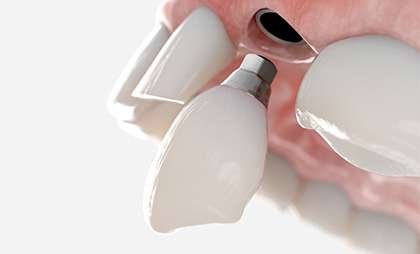Dental Crowns

WHAT ARE THE DENTAL CROWN TREATMENTS?
Dental crowns, also known as dental caps, are prosthetic appliances. They are designed to cover a damaged or weakened tooth to restore the tooth’s structure, function, shape, size, and appearance. A dental crown is designed to completely encase the visible portion of the tooth above the gum line. It is cemented into place to protect the tooth and improve its function. The function of a dental crown is to provide strength and protection to a weakened or damaged tooth. Crowns can help prevent further damage to the natural tooth and restore the tooth’s function. This allows the patient to eat and speak more comfortably. Dental crowns are used for cosmetic purposes as well to improve the appearance of a tooth that is discolored or misshapen. Dental crowns are typically made from various materials, depending on the type, including porcelain, ceramic, gold, or a combination of materials. The type of crown recommended will depend on the tooth’s location, the damage’s extent, and the patient’s preferences and budget. Consult your dentist; he is the one to help you choose the best type of crown for your needs.



TYPES OF DENTAL CROWNS
There are several types of dental crowns, including:
- Porcelain crowns: These crowns are made of a ceramic material that closely resembles the appearance of natural teeth. They are often recommended for front teeth or teeth that are highly visible.
- Metal crowns: These crowns are made of gold, silver, or other metals and are known for their durability and strength. They are often recommended for back teeth or teeth that are not highly visible.
- Porcelain fused to metal (PFM) crowns: These crowns have a metal base covered with a layer of porcelain. This provides a natural looking appearance.
- All-ceramic crowns: These are made entirely of ceramic or porcelain, boosting your oral hygiene and providing excellent aesthetics and strength.
It is important to note that not all patients are good candidates for dental crowns. Patients with advanced gum disease or a history of gum disease may not be suitable for dental crown treatments. This is because gum disease must be treated first.
Patients with a history of severe allergic reactions to metals may not be good candidates for metal-based crowns. Your dentist can help determine if dental crowns are the right treatment option based on your needs and oral health history.

STAGES OF DENTAL CROWN PROCESS
The process of getting a dental crown is done under local anesthetic. It involves several stages. These stages may vary depending on the individual case, and the patient’s needs. The general steps of getting a dental crown are as follows:
- Consultation: The first stage of getting a dental crown is the consultation with the dentist. During this stage, the dentist will examine the patient’s teeth and determine if a crown is the right treatment option. The dentist will also discuss the different types of crowns available, the procedure, and the cost.
- Tooth preparation: Once the decision has been made to proceed with a dental crown. The dentist will prepare the tooth that will receive the crown. That involves removing any decay or damage and reshaping the tooth to make room for the crown.
- Impression: After the tooth is prepared, the dentist will take an impression of the tooth and the surrounding teeth. This impression w to create a custom-made crown that will fit the patient’s mouth.
- Temporary crown: While the permanent crown is being made in a dental laboratory. The patient will be given a temporary crown to protect the prepared tooth.
- Crown placement: Once the permanent crown is ready, the temporary crown will be removed. Then the permanent crown will be placed over the prepared tooth. The dentist will make any necessary adjustments to ensure the crown fits properly and feels comfortable.
- Follow-up: After placing the crown, the patient must return for a follow-up visit. This will ensure that the crown is functioning correctly and has no issues.
Getting a dental crown takes 2-3 visits to the dentist and can take around a week from start to finish. The specific timeline will depend on the individual case and the type of crown being used.



- Category
- DENTAL CARE

